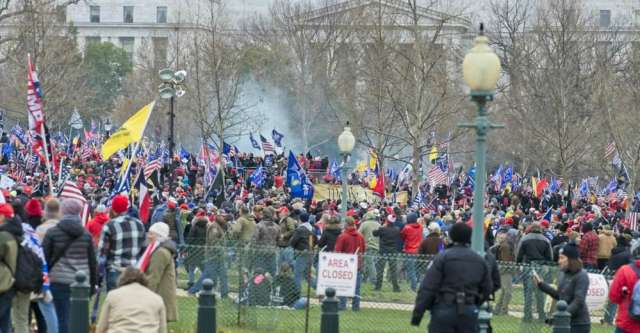Federal judges have begun releasing Jan. 6 defendants who challenged their sentences even though the Supreme Court is a week away from hearing arguments on whether a key charge brought against them is legally sound.
The Crime
The attorneys of three Jan. 6 defendants are set to argue before the Supreme Court that the crime of obstructing or impeding an official proceeding is only limited to destroying evidence in a governmental probe. The Department of Justice (DOJ) warned a Jan. 6 defendant Tuesday that his sentence would not be reduced, regardless of the Supreme Court’s decision in a coming case related to a statute he was charged under.
The Supreme Court agreed to take up the cases in December. The obstruction statute, Section 1512(c)(2), threatens fines or up to 20 years in prison for anyone who “obstructs, influences, or impedes any official proceeding.
Although an appeals court ruled that the DOJ wrongly sought lengthened Jan. 6 sentences, Biden’s DOJ insists it has the right to seek extended sentences for Jan. 6 defendants who interfere with the “administration of justice.”
Jan. 6 defendant Anthony Williams asked the court in February to grant him bond pending his appeal in light of the Supreme Court’s decision to take up Fischer v. United States, which challenges the scope of an obstruction statute used to charge him, along with hundreds of other Jan. 6 defendants. The DOJ warned in a court filing Tuesday that despite the pending case, it would increase its sentencing recommendation on the remaining counts to maintain the current sentence length [1].
Examples Of Release
A Delaware man who carried a Confederate flag into the Capitol is released one year into his three-year term. An Ohio man who allegedly overran police lines and became one of the first rioters to enter the Capitol will be set free six months into a 19-month term. And a man who entered the empty Senate chamber with a Trump flag as a cape was released after serving five months of a 14-month term.
Supreme Court Decides
If the Supreme Court determines the charge they faced was legitimate, they and others who are released early could be ordered to return to prison — but that is not definite. The Court may decide there is substantial interference with the administration of justice.
It is the latest setback in prosecuting more than 350 defendants under a federal statute that criminalizes obstructing an official proceeding. While tapes and recordings show that these so-called protesters were escorted into the building by officers and did not obstruct proceedings, the local judge continues to condemn them. Congress had convened that day to confirm Biden’s 2020 alleged victory.
The question remains: why are judges releasing American citizens who were declared guilty before their appeal trial?
Notes:
- ^ {Biden DOJ: Jan. 6 defendants may still face heightened sentences despite SCOTUS challenge} (go back ↩)

